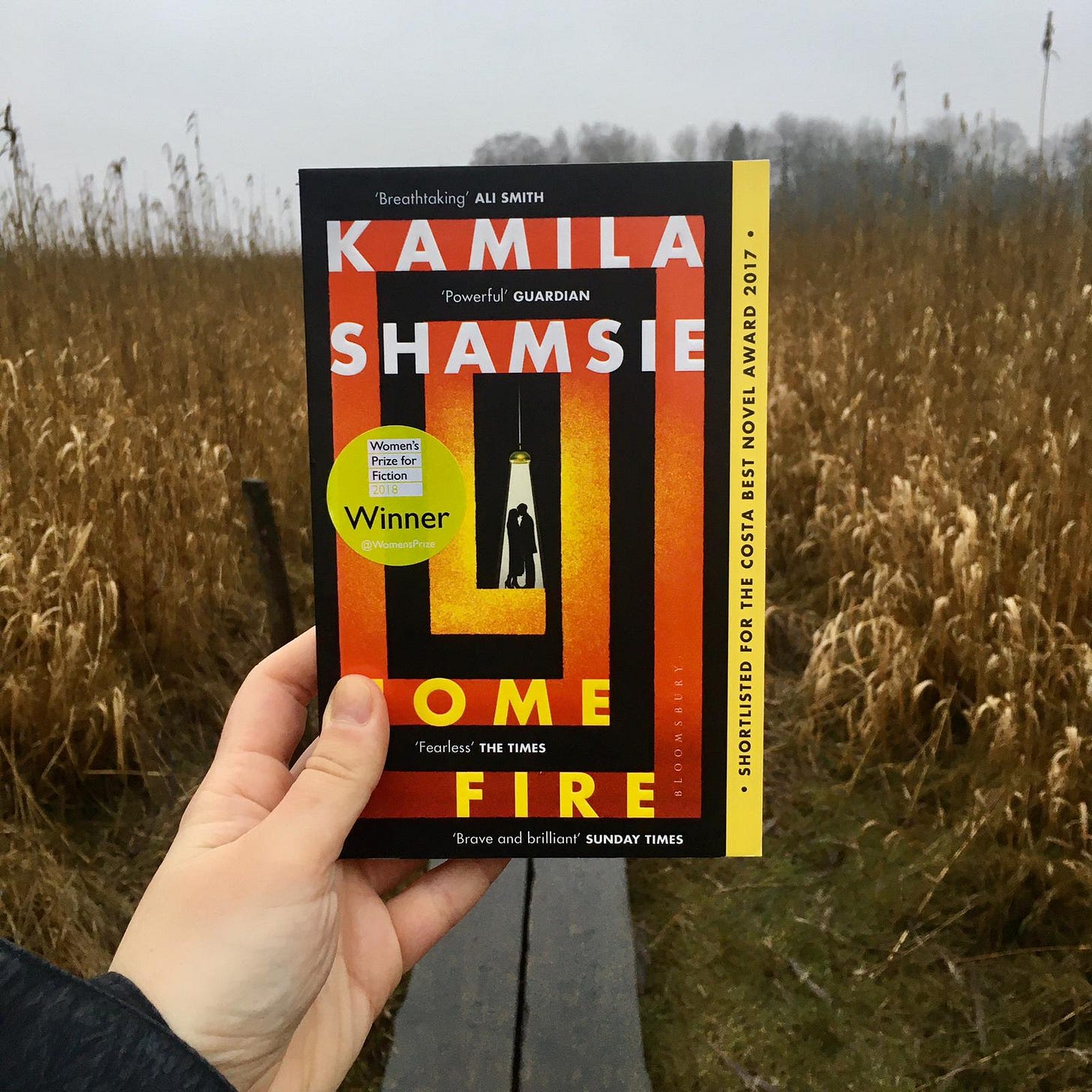Welcome to Bookmarked, a weekly newsletter following my journey as I read one book from every country. If you’re enjoying my project, I’d love it if you shared Bookmarked with a friend.
Home Fire is British-Pakistani author Kamila Shamsie’s contemporary reimagining of Sophocles’ Antigone. The winner of the 2018 Women’s Prize for Fiction, it is a pacey, plot-driven tragedy centred around the relationships between two British Muslim families—the Pashas and the Lones—and the British state.
The novel is told in chapters that alternate in focus between its five main characters: Isma, Aneeka, and Parvaiz Pasha; and Eamonn and Karamat Lone. The Pasha siblings had a tragic childhood: abandoned by their terrorist father, they were orphaned when their mother died eight years ago and have long been under the surveillance of the British Security service. Meanwhile British Secretary Karamat Lone is a controversial politician who has built a successful career by rejecting his own Muslim background in an effort to be accepted by his predominantly white constituents.
Our first protagonist is twenty-eight year old Isma who has recently moved from London to Massachusetts in order to pursue a career in academia. It is in Massachusetts that Isma meets Eamonn, a fellow Brit from a Pakistani family and the son of Karamat Lone.
Their talk was insubstantial—the weather, the overfriendliness of strangers in America, favourite London bus routes (which revealed nothing so much as the distinct geography of their lives)—but even so, the Englishness of his humour, and his cultural references, were a greater treat than she would have expected.
Though there is an undeniable connection between Isma and Eamonn, back in London Eamonn meets, and instantly falls for, Aneeka. They start dating and it doesn’t take long before Eamonn learns why Aneeka is being so secretive: her twin brother Parvaiz is currently in Syria, having been exploited and groomed into radicalism. Upon learning that he wants out, Aneeka pursues a relationship with Eamonn, hoping that he’ll somehow be able to use his father’s political connections to help Parvaiz get back to the UK.
I wanted Eamonn to want to do anything for me before I asked him to do something for my brother. Why shouldn’t I admit it? What would you stop at to help the people you love most?
And so two families’ fates are devastatingly entwined in what turns out to be a smart and gripping story about what happens when love and politics collide. A powerful exploration of clashing loyalties, Home Fire is a real page-turner whose mounting tension had me gripped until the very end.
In just 260 pages, Shamsie writes insightfully about life as a British Pakistani Muslim, raising interesting questions about gender, ambition, and grief. With the possible exception of Isma, who I felt was a little short-changed by her exposition-heavy opening chapter, Shamsie’s characters are rounded and believable and her ability to slowly build tension before ramping it up is extraordinary.
I raced through Home Fire in just a couple of days and it’s been on my mind ever since.
Home Fire by Kamila Shamsie (Bloomsbury, 2017)
More books by Pakistani authors
Here’s a list of the other recommendations I received this week:
Saffron Dreams by Shaila Abdullah
The Shadow of the Crescent Moon by Fatima Bhutto
How It Happened by Shazaf Fatima Haider
A Case of Exploding Mangoes by Mohammed Hanif
Karachi, You’re Killing Me by Saba Imtiaz
Hijabistan by Sabyn Javeri
Unmarriageable by Soniah Kamal
The Miraculous True History of Nomi Ali by Uzma Aslam Khan
Unfettered Wings by Sana Munir
A Season for Martyrs by Bina Shah
What have you read recently?
If you’ve read a brilliant book in translation or want to pass on a recommendation, I’d love to hear about it! For this project, I’m focussing on contemporary fiction and short stories, with a preference for female authors—but I won’t be too dogmatic about it so do share recommendations that don’t quite fit the bill, too.
You can get in touch by replying to this email or leaving a comment. I’ll be featuring your recommendations in upcoming newsletters, and I’ll keep a growing list here.
Bookmarked is written by Tabatha Leggett. Thank you to Sheeraz Dasti from the Literary Society of Pakistan and Jonny Allinson for their recommendations for this issue. If you know someone who would enjoy this newsletter, please forward it to them!





On the behalf of Literary Society of Pakistan, dear Tabatha Leggett, thank you for mentioning Dr. Sheeraz Dasti and LSP. Best of luck for your future endeavors.